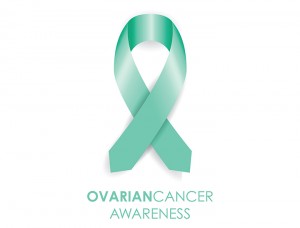
On Wednesday 28th of February, Teal Ribbon Day will be held to raise awareness of ovarian cancer, to support women battling the disease, and to remember lives lost. Every year, about 250,000 women will be diagnosed worldwide. Ovarian cancer often has symptoms, but they can be hard to detect. Let’s look at some facts you might not know about ovarian cancer.
Who is at risk for ovarian cancer?
Ovarian cancer is a type of gynaecological cancer, a group that also includes endometrial cancer and cervical cancer. There are no routine screening tests that can detect ovarian cancer – some women assume their cervical smears have them covered, but they are only for cervical cancers.
While there are risk factors that increase the chances that someone might develop this type of cancer, remember that many people who end up diagnosed with it have few or none of these risk factors, whereas some women with an increased risk will never develop ovarian cancer.
Risk factors.
The risk of ovarian cancer might be increased for women who:
- Are over the age of 50
- Have gone through menopause
- Have a genetic risk – two or more women from the same side of the family indicates an increased genetic risk.
- Have never had children
- Have never used oral contraceptives
- Have endometriosis
- Have unhealthy lifestyle factors such as smoking, eating a high fat diet or being overweight
- Have hormonal issues, such as early puberty or late menopause.
Common symptoms of ovarian cancer.
Ovarian cancer often comes with symptoms, but they can be similar to the symptoms from less serious health complaints. The four most common symptoms are pain in the pelvis or abdomen, an increase in size or bloating of the abdomen, urinating often or urgently, and feeling full after eating a small amount.
Just because you have some of these symptoms doesn’t mean you have cancer, so you shouldn’t panic. There is most likely another explanation for your symptoms, but if common illnesses are ruled out then ovarian cancer should be considered. A disease like ovarian cancer requires you to know your body and trust your instincts.
Ovarian Cancer Australia list other common symptoms as:
- Changes in your bowel habits.
- Unexplained weight gain or weight loss.
- Bleeding in-between periods or after menopause.
- Back pain.
- Indigestion or nausea.
- Excessive fatigue.
- Pain during intercourse.
Speak Out.
Remember that no one knows your body as well as you do, so don’t ignore any warning signs. If you have symptoms frequently over a 4-week period and they are unusual for you, talk to your GP. If you are not confident in your doctor’s diagnosis, it’s ok to seek a second opinion. Don’t forget to buy a teal ribbon on the 28th of this month to help raise funds and awareness for ovarian cancer.
Click here to book an appointment with a GP to discuss ovarian cancer –>
